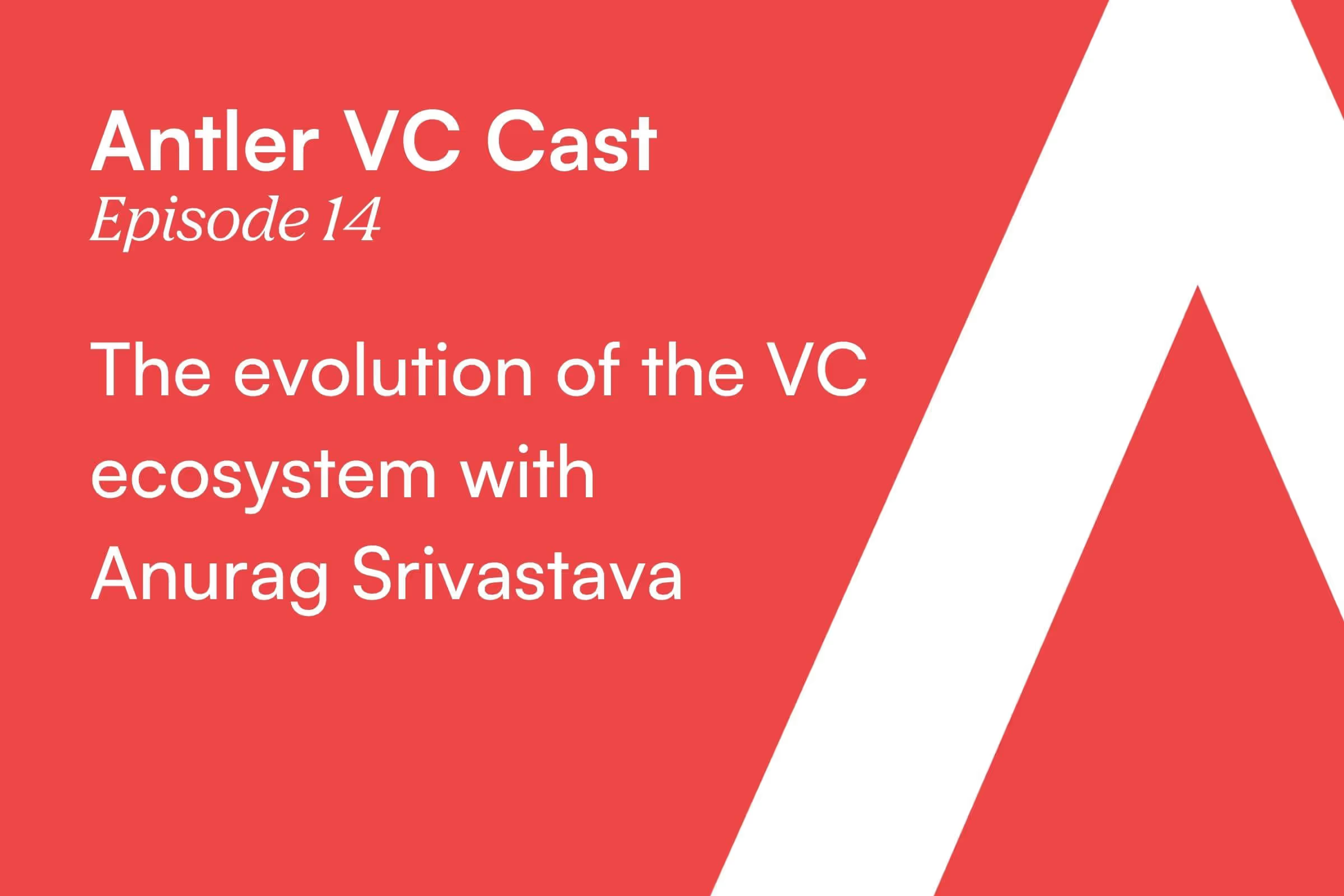Key Highlights From Transcript
[4:30] - Anurag explains how the Southeast Asian VC ecosystem will benefit from the Global capital flow and interest in the region
[14:05] - Anurag highlights how Covid-19 has impacted his investment approach and paved the way for new innovation to thrive
[18:22] - Anurag explains Jungle Venture's unique approach to concentrated investing
On the evolution of the venture capital ecosystem over the last decade
Puja Bharwani: What are some of the milestones you have witnessed in the VC world in your long journey over these years?
Anurag Srivastava: It's certainly been interesting. I basically became an angel investor in around 2006, and actually, that's when the Indian VC ecosystem was just starting. So if you look at that - 2007 to 2012, those four or five years, from our perspective here in Southeast Asia, largely saw sub-tech entrepreneurs using their own money with some support from the ecosystem. I was also doing the same thing, as a tech entrepreneur myself. At the same time, I was doing some angel investing, but 2012 is when things started to turn around.
GrabTaxi was founded around that period. 2012 is roughly when we did our first fund, which was a $10 million fund. Back then, we were the largest fund. It's a little bit embarrassing, but that is what it was. And from 2015 onwards, things really started to pick up. In 2016, we did our second fund, which is a $100 million fund.
We struggled to raise our first fund, but our second fund was supposed to be $40 million and ended up being $100 million.
If you look at what's happened from 2015 to now, I think it's been an amazing evolution of this space. In 2019, I think we saw 12 or 13 billion dollars invested in the private equity space.
On the potential for Southeast Asia's growth with Global capital flow
Anurag Srivastava: I think the next five years are going to be fascinating. In Southeast Asia, we've got China on one side: there's a lot of capital coming in and there are border issues going on. Because of some of the macro changes, I think Southeast Asia will benefit from that. And then there's a lot of Indian companies which are looking at Southeast Asia as an expansion because they have an offering for this part of the world. You're starting to see the VCs from India coming into this part of the world. I think this is the obvious next diversification for a lot of Global investors.
If you look at our first fund it was all angels. Our second fund was largely family offices and Asian investors. But in our third fund, almost 65% of our investors were non-Asian. So we continue to see that trend coming in. And then also from an exits perspective, I think we will see an exponential increase in the exits that'll happen here in the form of IPO or mergers and unicorns buying smaller businesses. So it's just amazing to see the quality of entrepreneurial flow.
So when you add all that up, to me I feel the next five years will be fascinating and Southeast Asia is going to grow through this process faster and catch up. And that will set the foundation for maybe 10 or 15 years after that.
On how Covid-19 has made companies go back to their core
Puja: How has 2020, Covid and everything that's happened changed your investment approach?
Anurag Srivastava: If I look at the existing portfolio, you can clearly see that there are founders who acted, rediscovered, reimagined, made the changes, made the cuts, and went back to basics. I think one of the things that we were starting to see is that with a lot of capital available, many tech companies were moving away from being tech companies. One of our companies had hired 800 people to do something which technology should actually do. And they realized during Covid as they needed to downsize, the first thing they did was to cut those 800 people, only to realize they should have never hired them.
I think it's natural that when you go on holiday, you come back 2 kgs heavier. That is one thing that certainly has happened with the existing portfolio - they have gone back to their core, their competitive intensities have reduced, and they are thinking about more fundamental-based businesses, not just profit.
I think it's important to balance profit and growth, but the fundamentals of the business are important to look at.
But from a COVID perspective, it's interesting because I think some things will permanently change, which will lead to new companies getting formed. And some things will come back. Restaurants are already an example of this in Singapore - it's hard to get any table. The only thing that's changed in restaurants now is that you have to leave after two hours because they are booked three times over. And that may create an opportunity for some startup for someone else.
On new business opportunities emerging from the pandemic
I think that the way people travel will change. Asians, for example, have never traveled by road as much as what happens in the Western world. I'm seeing startups coming up in that space. Alternate medicine is something that Asia is always known for whether you look at Korean or Japanese, Chinese, Indian Ayurvedic medicine. It's always been undervalued and now the real world is looking and saying, "Why are people not dying in these countries?" When you look at HR software, we always talked about white-collar workers, but during COVID we saw an issue with construction workers. Millions of workers in India went back to their villages but there's no system for them. Nobody knows who they are, where they are, or which of them should come back. So I think there are businesses and ideas like that, which have emerged from Covid, which will permanently remain. And these are some of the areas we are looking at investing in.
On the Jungle approach to investing
Anurag Srivastava: The difference between Jungle and other VCs is that from day one, we have taken upon the idea of concentrated investing and creating Global built-to-last companies. In our first fund of $10 million, we were writing $1 million checks and nobody writes a million-dollar check. Even when I was an angel investor, my angel investments were 1 to 2 million, for whatever little money I had.
What we do is at any point in time, we have two or three areas where we think that we would like to invest. What we do is pick a thesis, build a conviction within that area. We find a specific part where we would like to potentially invest where there are problems to be solved, then look at all the companies funded in that ecosystem. If we don't find anything, we don't mind looking for an entrepreneur and maybe even incubating it.
We did that with Moglix, which is our B2B commerce company in India, where Accel and Jungle took a founder who was working for Google in Singapore, pulled them out, and said "let's build something in this space". And then we essentially go and back these companies. Ideally, we would do one in Southeast Asia and one in India in the same space. So there's a lot of learning, a lot of sharing, and maybe possible synergies over time.
On responsible investing
I think in the process of investing you choose who you want to impact. Do you want to impact the environment? You can help the environment and still be an enterprise. In KiotViet, which is one of our investments in Vietnam, we have 100,000 mom-and-pop shops coming onto our platform, getting enabled, building a living for themselves, getting their kids to school, turning into entrepreneurs and that's growing really fast. And if you look at the kind of scale and impact that has, it's no different than potentially what we're trying to do, let's say in another startup in Milaap where we raise money to give people so that poor people can actually solve a problem.
So if I collectively look at our investments and if you start classifying impacts - how people have gotten jobs, how many people have a home now, or how many people's school kids education is now paid for - it's a very massive impact.
I think I would say that in the core of it, from our perspective at Jungle, social impact is core to our investment ethos.
On fluid versus static intelligence
Jussi Salovaara: What keeps you going?
Anurag Srivastava: I think just being entrepreneurial. It's an amazing experience. I would tell anybody to be an entrepreneur. And being able to work with these amazing entrepreneurs just keeps you relevant. As you get older, one thing you always worry about is becoming irrelevant. When you talk about your "crystallized knowledge or intelligence", it's all the knowledge that you've acquired over the years. But your "fluid knowledge or intelligence", which is all your ability to innovate, starts to decline. And these entrepreneurs are filled with fluid intelligence, they are just constantly innovating. And that just keeps me going. I wake up in the morning and I just go sit in front of one of these founders and it's amazing to see that. And you learn and wherever possible, contribute.









%20(1)%20(1).jpg)
%202%20(1).avif)
%20%20(1)%20(1).avif)
